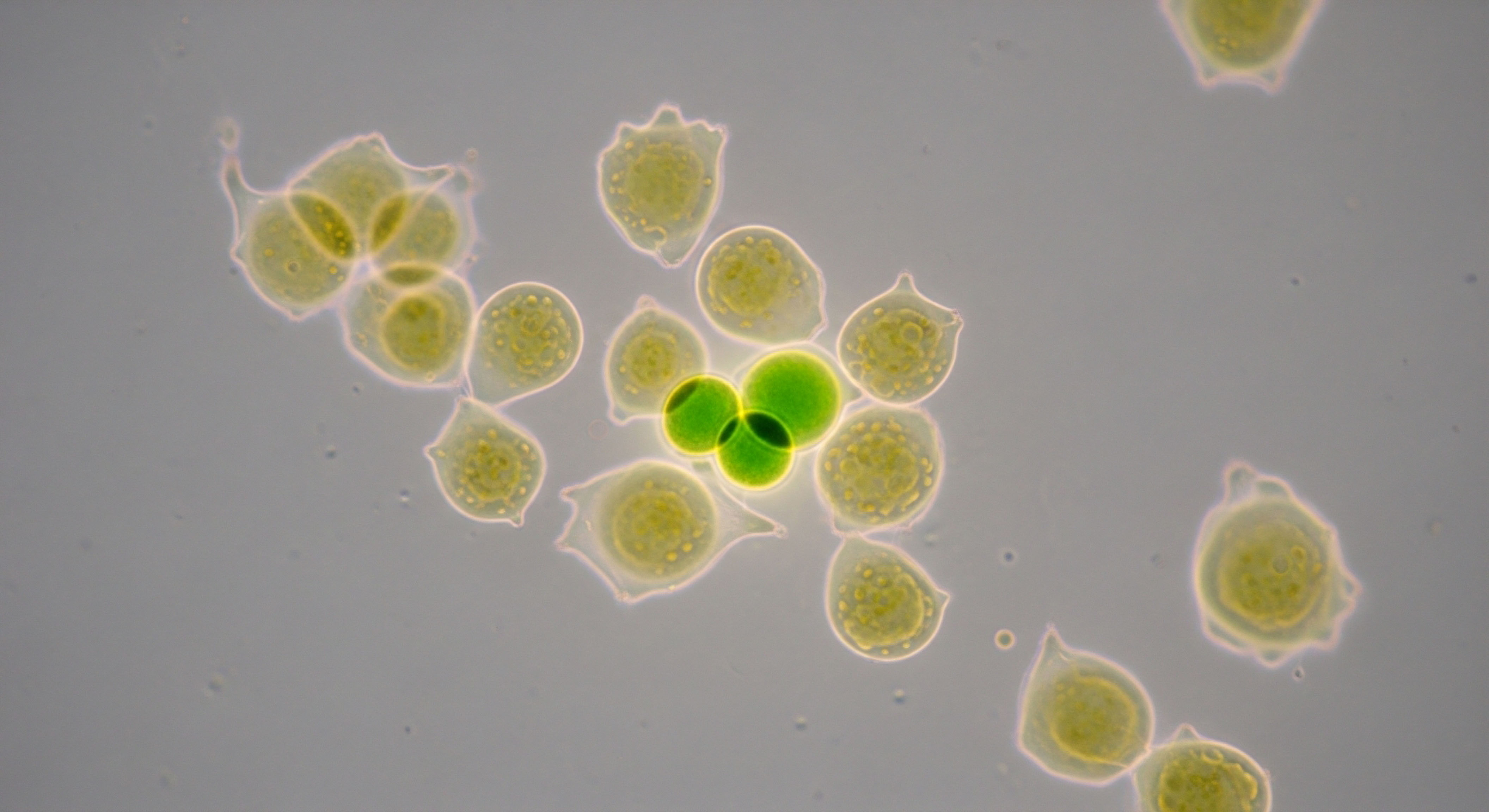

Fundamentals
The experience of watching your cognitive sharpness soften with time can be profoundly disorienting. Moments of forgetfulness or a feeling of mental fog are not just frustrating; they are deeply personal, touching upon the core of your identity and capability.
This lived reality is the starting point for understanding the intricate connection between your internal hormonal environment and your brain’s vitality. The biological shifts that occur with age, particularly the decline in key hormones, are directly linked to the operational capacity of your neural networks.
Addressing the question of whether personalized hormone strategies can mitigate age-related cognitive decline requires us to look at the body as a beautifully complex, interconnected system where chemical messengers dictate function, mood, and mental acuity.
Your brain is a profoundly active endocrine organ, both producing and responding to hormones. These molecules are the body’s internal messaging service, carrying critical instructions that regulate everything from energy metabolism to cellular repair. When these signals become faint or erratic, as they do during perimenopause, andropause, and other periods of hormonal transition, the systems they govern can lose their rhythm.
This includes the very systems responsible for memory, focus, and processing speed. The sensation of “brain fog” is a subjective experience rooted in objective biochemical changes. It is your brain signaling that its resources are being challenged, that the chemical environment that once supported effortless cognitive function is changing.
Understanding this connection is the first step toward reclaiming control. The conversation about hormonal health is a conversation about cellular health. Hormones like estrogen, testosterone, and progesterone, along with signaling peptides, have profound neuroprotective roles. They shield neurons from damage, support the growth of new neural connections, and modulate inflammation.
The decline of these protective agents leaves the brain more vulnerable to the stressors of aging. Therefore, a personalized strategy is about restoring this protective biological environment, providing your brain with the resources it needs to maintain its structural integrity and functional resilience. This process begins with recognizing that your symptoms are valid biological signals, worthy of investigation and a targeted, science-driven response.


Intermediate
To appreciate how personalized strategies can address cognitive changes, we must examine the specific roles key hormones play within the central nervous system. These are not blunt instruments but precise modulators of neural function. Their decline creates distinct deficits, and their careful restoration can address these issues systemically. The goal of hormonal optimization protocols is to re-establish a physiological environment that supports brain health, using bioidentical hormones and targeted peptides to mimic the body’s innate signaling mechanisms.

The Neuroprotective Trio Estrogen Testosterone and Progesterone
Estrogen, particularly estradiol (E2), is a cornerstone of female cognitive health. It acts directly on the hippocampus and prefrontal cortex, brain regions essential for memory and executive function. Estradiol supports neuroplasticity, the process of forming new synaptic connections, which is the cellular basis of learning and memory.
It also has antioxidant properties and helps maintain cerebral blood flow, ensuring neurons receive adequate oxygen and nutrients. Clinical observations show that the sharp decline in estrogen during menopause often coincides with a noticeable drop in verbal memory and processing speed. A personalized strategy for women often involves transdermal estradiol, which provides a steady, physiological dose that can help preserve brain volume and function, especially when initiated within the “critical window” of early post-menopause.
In men, testosterone serves a parallel role. While often associated with libido and muscle mass, testosterone is a powerful neuromodulator. It is converted to estradiol directly within the male brain, conferring similar neuroprotective benefits. Low testosterone levels in men are consistently linked to poorer performance in cognitive domains like spatial memory and verbal fluency.
Testosterone Replacement Therapy (TRT), typically involving weekly injections of Testosterone Cypionate, aims to restore levels to an optimal physiological range. This biochemical recalibration can improve mood and reduce mental fatigue, which are foundational to cognitive performance. The protocol is often augmented with Anastrozole to manage the conversion to estrogen systemically and Gonadorelin to maintain the function of the Hypothalamic-Pituitary-Gonadal (HPG) axis.
Personalized hormone protocols aim to restore the brain’s optimal chemical environment, directly supporting the cellular machinery of memory and focus.
Progesterone and its neuroactive metabolite, allopregnanolone, are also vital for cognitive well-being. Allopregnanolone is a potent positive modulator of GABA-A receptors, the brain’s primary inhibitory system. This action produces a calming, anxiolytic effect that is essential for mental clarity and restorative sleep.
The erratic fluctuations and eventual decline of progesterone during perimenopause can lead to anxiety, irritability, and sleep disturbances, all of which severely impact cognitive function. Supplementing with micronized progesterone at night can support GABAergic tone, improve sleep architecture, and thereby enhance daytime cognitive performance.

Growth Hormone Peptides a New Frontier in Cognitive Enhancement
Beyond traditional hormonal optimization, growth hormone (GH) peptide therapy offers a sophisticated approach to supporting cognitive health. As we age, the pulsatile release of GH from the pituitary gland diminishes, impacting cellular repair and regeneration throughout the body, including the brain. Peptides like Sermorelin, Ipamorelin, and CJC-1295 are secretagogues, meaning they stimulate the pituitary to produce and release the body’s own growth hormone. This approach is more physiological than direct HGH injections.
The benefits for the brain are multifaceted. Increased GH levels can enhance neurogenesis, improve synaptic density, and reduce neuroinflammation. Patients undergoing peptide therapy often report improved mental clarity, enhanced focus, and better sleep quality, all of which contribute to superior cognitive function. These peptides essentially provide the brain with the necessary signals to initiate its own repair and maintenance programs, building resilience against age-related decline.
| Hormonal Agent | Primary Mechanism of Action | Observed Cognitive Benefit |
|---|---|---|
| Estradiol | Supports neuroplasticity and cerebral blood flow; antioxidant effects. | Improved verbal memory, processing speed, and protection against neuronal damage. |
| Testosterone | Converted to estradiol in the brain; modulates dopamine and other neurotransmitters. | Enhanced spatial memory, verbal fluency, mood, and motivation. |
| Progesterone | Metabolizes to allopregnanolone, which enhances GABA-A receptor activity. | Reduced anxiety, improved sleep quality, and promotion of neuronal repair. |
| GH Peptides (e.g. Ipamorelin) | Stimulate endogenous release of Growth Hormone from the pituitary gland. | Increased mental clarity, focus, neurogenesis, and cellular repair. |


Academic
A sophisticated analysis of hormonal mitigation strategies for age-related cognitive decline requires a systems-biology perspective, moving beyond the action of a single hormone to the interplay of entire endocrine axes and their downstream cellular and molecular consequences.
The central hypothesis is that age-related cognitive decline is, in large part, a manifestation of progressive neuroinflammation and diminished metabolic efficiency, both of which are exquisitely sensitive to the hormonal milieu. Personalized protocols represent a form of systems-level intervention designed to restore homeostatic signaling that preserves neuronal function.

The HPG Axis and Its Central Role in Neurodegeneration
The Hypothalamic-Pituitary-Gonadal (HPG) axis is the primary regulator of sex steroid production. Its age-related dysregulation is a critical upstream event in cognitive aging. In women, the menopausal transition represents a dramatic failure of this feedback loop, leading to a state of profound estrogen deficiency.
In men, andropause reflects a more gradual decline in both hypothalamic sensitivity and testicular output. The consequences for the brain are severe. Estrogen receptors (ERα and ERβ) are widely distributed in brain regions susceptible to Alzheimer’s disease (AD), including the hippocampus and cerebral cortex.
Estradiol binding to these receptors initiates a cascade of genomic and non-genomic effects that are fundamentally neuroprotective. These include the upregulation of anti-apoptotic proteins like Bcl-2, the enhancement of antioxidant enzymes, and the potentiation of neurotrophic factors like Brain-Derived Neurotrophic Factor (BDNF).
The “critical window” hypothesis posits that the neuroprotective efficacy of estrogen replacement is timing-dependent. Clinical trial data suggests that initiating hormone therapy long after the onset of menopause may fail to confer cognitive benefits and could even be detrimental, possibly because the underlying neural architecture has already undergone significant degradation.
Conversely, initiating therapy in early perimenopause may preserve the neural substrate, preventing the cascade of inflammatory and atrophic changes from taking hold. This underscores the importance of proactive, personalized assessment and intervention.

How Do Hormones Regulate Brain Inflammation in China?
The regulatory landscape for hormonal therapies in China presents a unique context. While the fundamental biology of hormonal influence on neuroinflammation is universal, access to and perception of treatments like HRT are shaped by local medical guidelines and cultural factors.
Research and clinical practice in China are increasingly aligning with global standards, but the integration of advanced protocols like peptide therapies may proceed at a different pace. Understanding the specific guidelines from the Chinese Medical Association regarding menopausal management and andropause is essential for any clinical application within that jurisdiction. The approval status and availability of specific formulations, such as transdermal estradiol versus oral conjugated equine estrogens, or specific peptides, will dictate the practical implementation of these strategies.
- Regulatory Approval ∞ The China National Medical Products Administration (NMPA) governs the approval of all pharmaceutical agents. The specific formulations of testosterone, estradiol, progesterone, and peptides available differ from those in other regions.
- Clinical Guidelines ∞ Medical societies in China publish their own clinical practice guidelines. These documents outline the standard of care for conditions like menopause and hypogonadism, influencing physician prescribing habits and patient access.
- Patient Awareness ∞ Public and patient understanding of hormonal health and its connection to cognitive decline can vary. Educational initiatives are a key component of effective implementation, ensuring patients can make informed decisions based on sound scientific principles.

The Interplay of Hormones and Neurotransmitter Systems
Hormones do not act in a vacuum; they are in constant dialogue with the brain’s neurotransmitter systems. Testosterone, for instance, has a profound influence on the dopaminergic system, which is critical for motivation, focus, and executive function. Restoring optimal testosterone levels can enhance dopaminergic tone, contributing to improved cognitive drive and performance.
Progesterone’s metabolite, allopregnanolone, is one of the most powerful modulators of the GABAergic system. Its decline can lead to a state of relative neuronal hyperexcitability, manifesting as anxiety and poor sleep. Restoring progesterone levels can rebalance this system, promoting neural calm and facilitating the deep, restorative sleep necessary for memory consolidation.
The timing of hormonal intervention is a critical determinant of its neuroprotective efficacy, highlighting the need for proactive and personalized strategies.
Growth hormone peptides exert their influence through the GH/IGF-1 axis. Insulin-like Growth Factor 1 (IGF-1), produced primarily in the liver in response to GH, readily crosses the blood-brain barrier. It promotes neuronal survival, enhances synaptic plasticity, and supports myelination.
Peptide therapies that restore a youthful pattern of GH secretion effectively boost central IGF-1 levels, providing a powerful stimulus for brain repair and resilience. This systems-level approach, which considers the interconnectedness of endocrine axes and neurotransmitter function, is the future of mitigating age-related cognitive decline.
| Endocrine Axis | Key Hormones | Associated Cognitive Domain | Impact of Dysregulation |
|---|---|---|---|
| Hypothalamic-Pituitary-Gonadal (HPG) | Estradiol, Testosterone, Progesterone | Memory, Verbal Fluency, Spatial Reasoning | Increased risk of neuroinflammation and atrophy; impaired synaptic plasticity. |
| Somatotropic (GH/IGF-1) | Growth Hormone, IGF-1 | Focus, Mental Clarity, Cellular Repair | Diminished neurogenesis, reduced synaptic density, impaired sleep quality. |

References
- Singh, Meharvan, et al. “Estrogen and neuroprotection ∞ from clinical observations to molecular mechanisms.” Journal of the American Geriatrics Society, vol. 49, no. 10, 2001, pp. 1403-1413.
- Maki, Pauline M. “Perspective ∞ Estrogen and the Risk of Cognitive Decline ∞ A Missing Choline(rgic) Link?” Advances in Nutrition, vol. 11, no. 4, 2020, pp. 773-776.
- Tan, S. and Y. C. Pu. “Testosterone and cognitive function ∞ current clinical evidence of a relationship.” Maturitas, vol. 45, no. 1, 2003, pp. 13-21.
- Reddy, Doodipala Samba. “Progesterone Modulates Neuronal Excitability Bidirectionally.” Frontiers in Endocrinology, vol. 12, 2021, p. 744725.
- Lazarov, Orly, and Michael W. Marlatt. “Growth Hormone Improves Cognitive Function After Experimental Stroke.” Stroke, vol. 49, no. 5, 2018, pp. 1244-1251.
- Talaei, A. et al. “Effect of Testosterone Replacement Therapy on Cognitive Performance and Depression in Men with Testosterone Deficiency Syndrome.” The World Journal of Men’s Health, vol. 35, no. 1, 2017, pp. 48-54.
- Wharton, Whitney, et al. “A multi-center, randomized, double blind placebo-controlled trial of estrogens to prevent Alzheimer’s disease and loss of memory in women ∞ design and baseline characteristics.” Contemporary Clinical Trials, vol. 29, no. 2, 2008, pp. 268-276.
- Henderson, Victor W. “Alzheimer’s disease ∞ review of hormone therapy trials and implications for treatment and prevention after menopause.” Journal of Steroid Biochemistry and Molecular Biology, vol. 83, no. 1-5, 2002, pp. 131-136.
- Christensen, A. and A. M. H. Pike. “Testosterone Supplementation and Cognitive Functioning in Men ∞ A Systematic Review and Meta-Analysis.” The Journal of Clinical Endocrinology & Metabolism, vol. 104, no. 6, 2019, pp. 2389-2401.
- Daniel, Jill M. and Amanda J. Daugherty. “Progesterone’s Effects on Cognitive Performance of Male Mice Are Independent of Progestin Receptors but Relate to Increases in GABAA Activity in the Hippocampus and Cortex.” Frontiers in Endocrinology, vol. 11, 2021, p. 552805.

Reflection
The information presented here provides a map of the biological territory connecting your hormonal landscape to your cognitive vitality. It details the mechanisms and pathways through which these powerful signaling molecules sustain the very architecture of thought and memory.
This knowledge serves a distinct purpose ∞ to move the conversation about age-related changes from one of passive acceptance to one of proactive, informed strategy. Your personal health journey is unique, and the data points within your own biology tell a specific story. Understanding the science is the foundational step.
The next is to consider how this applies to your own experience and what questions it raises about your path forward. The potential to maintain cognitive resilience lies in this intersection of scientific understanding and personalized application.



